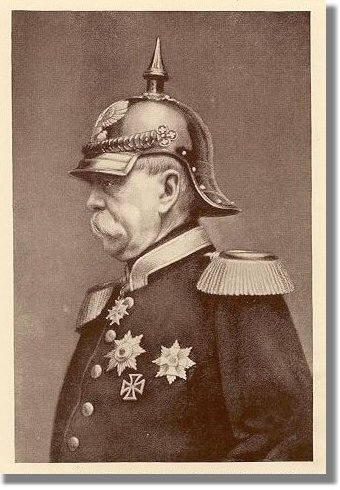I was reading an Andrew Sullivan piece in TNR on the prospect of a conservative revolt against George Bush, when I saw this:
I'm not sure that president Bush has ever been a believer in real personal freedom. On most social and cultural issues--from drug legalization to marriage rights--Bush has always been an authoritarian-style conservative. He has never consistently or boldly spoken of the need to restrain government as a good in itself. He has governed exactly as one would have expected, if you consider him a Texas adherent of the religious right who happened to grow up in a family committed to public service. Whatever the context, Bush has had choices. And almost every choice he has made has been in the direction of an authoritarian, big-spending conservatism, not a frugal, libertarian one.And then it hit me: George Bush is a lot like Otto von Bismarck.
Bismarck inherited a Prussian estate; Bush inherited an oil fortune. Both were mediocre students who spent their youth aimlessly. Politically, both Bush and Bismarck are traditionalist social conservatives without clear principles about economic matters, where they are guided by pragmatism rather than principle.
 Like Bismarck, Bush sees domestic politics as a means to an end - the end being political survival and the continuation of his foreign policy. Bismarck enacted the world's first social security system in order to buy the political support of the rapidly expanding class of industrial workers. Bush recently passed a prescription drug entitlement in the hope of buying the support of the nation's fastest-growing demographic cohort: the elderly. Bush throws bones (judicial appointments, partial-birth abortion ban) to his conservative base, just as Bismarck attacked Socialists and Catholics to keep his base of reactionary Prussian Junkers satisfied.
Like Bismarck, Bush sees domestic politics as a means to an end - the end being political survival and the continuation of his foreign policy. Bismarck enacted the world's first social security system in order to buy the political support of the rapidly expanding class of industrial workers. Bush recently passed a prescription drug entitlement in the hope of buying the support of the nation's fastest-growing demographic cohort: the elderly. Bush throws bones (judicial appointments, partial-birth abortion ban) to his conservative base, just as Bismarck attacked Socialists and Catholics to keep his base of reactionary Prussian Junkers satisfied.
Even the foreign policies of the two men are similar. Bismarck was haunted by the memories of the crushing defeat of Prussia at the hands of Napoleon. He used aggressive tactics - such as a "preemptive" war with France - to achieve the conservative goal of security. Bismarck disdained global ambitions; he once declared, "Colonies for Germany are like fur coats for Polish nobles". Similarly, Bush derided nation-building during his presidential run, but has ended up invading and then reconstructing Afghanistan and Iraq in the name of "homeland security".
But there is one glaring difference between Otto von Bismarck and George Bush: Bush's failure to subordinate domestic political gains to the greater goals of his foreign policy. Bush wants to practice realpolitik abroad while submitting fantasyland budgets at home. Sullivan:
He could have made an argument for general sacrifice, keeping the deficit manageable, while fighting an important war. He chose not to. I emphasize the word "chose." Rather than make the case for war responsibly and coherently, he argued that we could afford everything: guns, butter, margarine, whipped cream, whatever.In 1862, when the Reichstag balked at providing funding for the army, Bismarck berated them with these famous words:
The great questions of the day will not be decided by speeches and the resolutions of majorities... but by iron and blood.If George Bush would demonstrate an iron will in demanding the funding for a larger and stronger military, a lot less blood would have to be shed by American soldiers.
Marc
